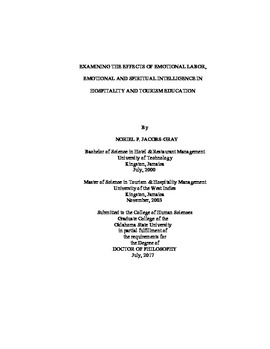| dc.contributor.advisor | Slevitch, Lisa | |
| dc.contributor.author | Jacobs-Gray, Noriel P. | |
| dc.date.accessioned | 2018-06-18T16:02:19Z | |
| dc.date.available | 2018-06-18T16:02:19Z | |
| dc.date.issued | 2017-07 | |
| dc.identifier.uri | https://hdl.handle.net/11244/300058 | |
| dc.description.abstract | Emotional intelligence (EI) and spiritual intelligence (SI) have been found to positively impact performance in various fields including business, medicine, psychology, and psychiatry. This study aimed to look comprehensively at the influence of EL, EI and SI on TP in hospitality and tourism education. This study adopted a multiple correlational analysis research design with self-reported questionnaire surveys. Data were collected electronically in an on-line format from 120 hospitality management university instructors. In an effort to attract maximum response rate, purposive sampling, coupled with snowball techniques were used. The results suggest that the respondents perceived and experienced emotional labor when performing their immediate line of work. Emotional intelligence was found to be a significant predictor of teachers' performance, with a moderate, positive association. Emotional labor and spiritual intelligence were not statistically significant predictors of teachers' performance. Additionally, based on the findings related to emotional labor and spiritual intelligence, the obtained evidence suggested that a large proportion of unexplained variance pointed to other factors influencing teachers' performance. The result was congruent with previous studies that reported EI to influence performance. The statistically significant positive relationship is an indication that the more emotionally intelligent the teacher, the better his or her performance at work will be. All institutions that train students to be teachers are encouraged to incorporate self-awareness and other aspects of EI into their teaching program and assess prospective students specifically with respect to EI before they graduate as qualified teachers. Studies have shown that high emotional labor, if not managed well, can lead to psychological and physical challenges such as increased job stress, decreased job satisfaction, and increased distress. Therefore, this study recommends that teachers in training are taught how to manage EL and that chairs, deans, and supervisors carefully monitor the EL of their faculty to ensure the wellbeing of faculty members. | |
| dc.format | application/pdf | |
| dc.language | en_US | |
| dc.rights | Copyright is held by the author who has granted the Oklahoma State University Library the non-exclusive right to share this material in its institutional repository. Contact Digital Library Services at lib-dls@okstate.edu or 405-744-9161 for the permission policy on the use, reproduction or distribution of this material. | |
| dc.title | Examining the effects of emotional labor, emotional and spiritual intelligence in hospitality and tourism education | |
| dc.contributor.committeeMember | Leong, Jerrold | |
| dc.contributor.committeeMember | Ryan, Bill | |
| dc.contributor.committeeMember | Washburn, Isaac | |
| osu.filename | JacobsGray_okstate_0664D_15416.pdf | |
| osu.accesstype | Open Access | |
| dc.type.genre | Dissertation | |
| dc.type.material | Text | |
| thesis.degree.discipline | Human Sciences | |
| thesis.degree.grantor | Oklahoma State University | |
